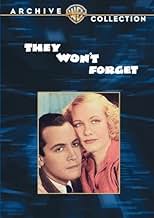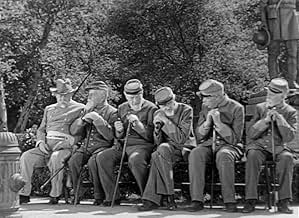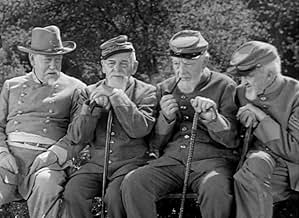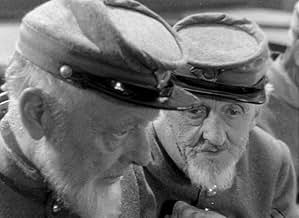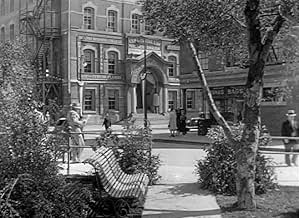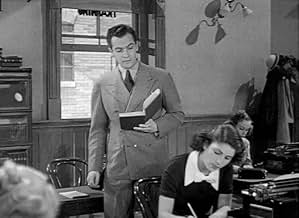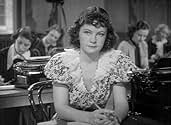IMDb RATING
7.2/10
2.1K
YOUR RATING
A politically ambitious district attorney, unscrupulous tabloid journalists, and regional prejudice combine to charge a teacher with the murder of his student.A politically ambitious district attorney, unscrupulous tabloid journalists, and regional prejudice combine to charge a teacher with the murder of his student.A politically ambitious district attorney, unscrupulous tabloid journalists, and regional prejudice combine to charge a teacher with the murder of his student.
- Director
- Writers
- Stars
- Awards
- 3 wins total
Elisabeth Risdon
- Mrs. Hale
- (as Elizabeth Risdon)
Sibyl Harris
- Mrs. Clay
- (as Sybil Harris)
- Director
- Writers
- All cast & crew
- Production, box office & more at IMDbPro
Featured reviews
They Won't Forget (1937)
**** (out of 4)
Terrific Warner drama about a school teacher (Edward Norris) from the North who's working in the South when one of his students his murdered. The local D.A. (Claude Rains), wanting to rise in the political game, charges the teacher with the murder not because of evidence but because the Southerners think he's guilty due to being from the North. I've been wanting to see this film for many years now after hearing so much about it and it certainly didn't let me down. I think the courtroom drama is probably my favorite genre and this here ranks with the very best out there. What really stands out are the performances, which are all excellent. Norris doesn't stand out in the crowd but he delivers a very somber performance. The real standout is Gloria Dickson as his wife. The final speech she gives is quite chilling and very memorable. Rains also gives a great performance, although I think he goes a bit over the top in a couple of the courtroom scenes. Lana Turner, in her screen debut, also comes off very memorable especially with her "giggle" as she walks down the street in that tight sweater. Mervyn LeRoy does a great job at building all the suspense and anger that surrounds the controversy of the case, which is based on a true story. After watching this film as well as Mississippi Burning this year it's rather amazing to know this stuff happened within the last one-hundred years.
**** (out of 4)
Terrific Warner drama about a school teacher (Edward Norris) from the North who's working in the South when one of his students his murdered. The local D.A. (Claude Rains), wanting to rise in the political game, charges the teacher with the murder not because of evidence but because the Southerners think he's guilty due to being from the North. I've been wanting to see this film for many years now after hearing so much about it and it certainly didn't let me down. I think the courtroom drama is probably my favorite genre and this here ranks with the very best out there. What really stands out are the performances, which are all excellent. Norris doesn't stand out in the crowd but he delivers a very somber performance. The real standout is Gloria Dickson as his wife. The final speech she gives is quite chilling and very memorable. Rains also gives a great performance, although I think he goes a bit over the top in a couple of the courtroom scenes. Lana Turner, in her screen debut, also comes off very memorable especially with her "giggle" as she walks down the street in that tight sweater. Mervyn LeRoy does a great job at building all the suspense and anger that surrounds the controversy of the case, which is based on a true story. After watching this film as well as Mississippi Burning this year it's rather amazing to know this stuff happened within the last one-hundred years.
10preppy-3
A young girl (Lana Turner in her first role) is killed in a small Southern town. A Northener, Robert Hale (Edward norris) is accused of it...but is he guilty? It doesn't seem to matter because everybody uses his accusation for their own gain. Fast moving, still relevant (sadly) look at prejudice, gossip, mob rule and media manipulation. Occasionally the characters give out unmotivated speeches (especially Hale's wife), but the movie is very well-written and acted with Claude Rain chewing the scenery again and again. A must see...don't miss this one!
Flawless blending of cynicism, humor and tragedy, this re-enactment of a real-life murder in the south consciously downplays the real-life anti-semitism in the real murder of Mary Phagan case, but carry more of an emotional wallop than the Jack Lemmon made-for-TV docudrama -- although the latter is still good on its own terms. Lana Turner has an impressive screen debut as the murder victim. Gloria Dickson is very powerful as the defendant's wife, and Claude Rains is magnificent as the politically minded prosecutor, but Allyn Joslyn as the cynical, burnt out reporter steals the show. A truly excellent example of how historically based movies can be among the most memorable.
It begins with a disclaimer that all characters are entirely fictitious, etc. etc., and cites as source material a novel, but you can't fool us: It's the Leo Frank trial of 1915, updated to the then-present-day South and with Frank's Judaism carefully removed. Other than that, the details are surprisingly close to the actual trial, and the downbeat ending chillingly mirrors reality. Warner Brothers, known in the 1930s as the socially conscious studio, had a message to flog, and in this case it goes a bit overboard: No character has more than one dimension, and even that excellent actor Claude Rains, as the DA, snarls and rolls his eyes and gesticulates wildly, overdoing the blind ambition bit. But for its day it's a pretty brave and out-there indictment against mob violence, bigotry, and sensationalism, particularly the latter. Indeed, the message one takes from it today is that the media hasn't really grown worse in the intervening years -- there's just more of it.
One of Warner Brothers' `hard-hitting' social comment dramas of the 1930s, They Won't Forget leaves viewers all riled up though, today, maybe less at the judicial process in the Deep South than at Mervyn LeRoy's depiction of it in the movie. Based not too loosely on the Mary Phagan murder case of 1913, it updates the events to the late Depression and also advances the victim's age (Phagan was 13; here, the victim an unrecognizable Lana Turner, in her debut is a student at a small business college).
It's Confederate Memorial Day, April 26, and the college lets out early, unexpectedly for instructor Edward Norris, a Northerner. But Turner returns for the vanity case she's left behind. Hours later, her body is discovered at the base of an elevator shaft. The town prosecutor (Claude Rains, slinging a Southern drawl) smells a political advantage that might propel him to the state senate, an advantage of no use if the perpetrator is only the illiterate black janitor who found her. Suspicion falls on Norris, and soon the judicial establishment, the press and the townspeople have turned against him. Outside help a detective and a defense attorney prove of no avail. Turner is convicted and sentenced to death; when the governor commutes his sentence, he's lynched (as was Leo Frank in the original case). It's fast, brutal and pretty unsentimental.
LeRoy was known for his slam-bang, take-no-prisoners style but here he dawdles at first. Under the credits is a medley of songs of the South, bolstered by quotations from Lincoln and Robert E. Lee to soften up those touchy audiences in Dixie so they won't know what hit them. When he gets up to speed, however, he doesn't slacken, cutting quick to advance the action his movie's an unstoppable steamroller, just like the judicial railroading of the story (the lynching itself, expressed by a mailbag clipped off its hook by a passing train, is especially and darkly adroit).
But there's a near-fatal flaw in the story. We're meant to harbor persuasive doubts as to Norris' guilt, but the possibility of a suspect other than he is never more than fleetingly entertained. The movie purports to document a miscarriage of justice, but it fails to build an ironclad case.
It's Confederate Memorial Day, April 26, and the college lets out early, unexpectedly for instructor Edward Norris, a Northerner. But Turner returns for the vanity case she's left behind. Hours later, her body is discovered at the base of an elevator shaft. The town prosecutor (Claude Rains, slinging a Southern drawl) smells a political advantage that might propel him to the state senate, an advantage of no use if the perpetrator is only the illiterate black janitor who found her. Suspicion falls on Norris, and soon the judicial establishment, the press and the townspeople have turned against him. Outside help a detective and a defense attorney prove of no avail. Turner is convicted and sentenced to death; when the governor commutes his sentence, he's lynched (as was Leo Frank in the original case). It's fast, brutal and pretty unsentimental.
LeRoy was known for his slam-bang, take-no-prisoners style but here he dawdles at first. Under the credits is a medley of songs of the South, bolstered by quotations from Lincoln and Robert E. Lee to soften up those touchy audiences in Dixie so they won't know what hit them. When he gets up to speed, however, he doesn't slacken, cutting quick to advance the action his movie's an unstoppable steamroller, just like the judicial railroading of the story (the lynching itself, expressed by a mailbag clipped off its hook by a passing train, is especially and darkly adroit).
But there's a near-fatal flaw in the story. We're meant to harbor persuasive doubts as to Norris' guilt, but the possibility of a suspect other than he is never more than fleetingly entertained. The movie purports to document a miscarriage of justice, but it fails to build an ironclad case.
Did you know
- TriviaThe novel "Death in the Deep South" and this movie version were based on the notorious murder trial and subsequent lynching of Leo Frank. The film mentions the suspect's Northern background, which was a factor in his lynching, but does not mention that he was Jewish. The real-life victim, Mary Phagan, was only 13 years old, a far cry from Lana Turner's 16-year-old "sweater girl."
- GoofsDuring the entire trial the shadow of the window is showing in the same place; behind the witness chair/over the back door of the courtroom.
- Quotes
Drugstore Clerk: What'll it all be be, ladies?
Imogene Mayfield: Dope and cherry, Fred.
Drugstore Clerk: [to Mary] How about you, half-pint?
Mary Clay: Make mine a chocolate malt and drop an egg in it as fresh as you are.
Drugstore Clerk: The hens don't lay 'em that good.
- ConnectionsFeatured in Hollywood and the Stars: The Angry Screen (1964)
- SoundtracksKingdom Coming
(1862) (uncredited)
aka "The Year of Jubilo"
Music by Henry Clay Work
Played during the opening credits
- How long is They Won't Forget?Powered by Alexa
Details
- Runtime
- 1h 35m(95 min)
- Color
- Sound mix
- Aspect ratio
- 1.37 : 1
Contribute to this page
Suggest an edit or add missing content


